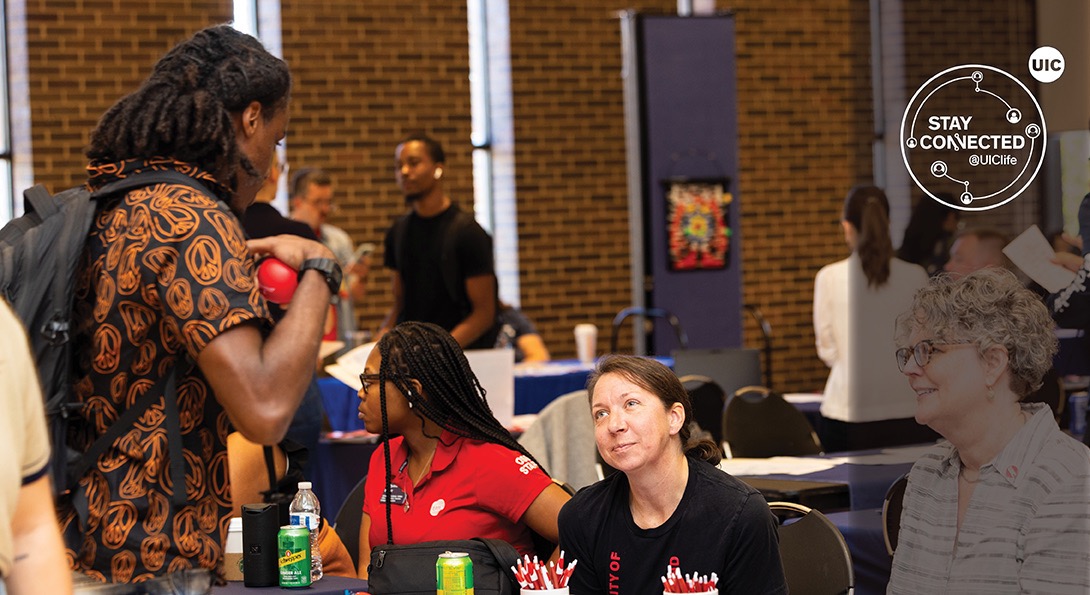Major Minor Fair 2023: Align Your Interests and Goals

Choosing a major can be a significant challenge in one's journey to adulthood. Many students begin college with uncertainty or change their majors at least once during their academic careers, and that's perfectly normal! UIC provides a diverse selection with 95 undergraduate degrees and 85 minors.
This month, UIC organized a Major Minor Fair, featuring representatives from various undergraduate programs who assisted students in exploring information, opportunities, and potential career paths. Couldn’t attend? No worries, UIClife gathered essential insights and summaries from various colleges to provide you with valuable guidance for selecting a program.
College of Applied Health Sciences (AHS):
AHS excels in rehabilitation and disability studies, offering diverse opportunities for patient care and fostering patient independence. Rachel Najdzin, AHS Director of Student Affairs, and Simona Stankevicius, Academic Advisor, explained, “All AHS students take courses in nutrition, therapies, kinesiology, and human development, preparing for professional programs.” Prospective students should exhibit a strong interest in math and science, leadership, case management, and a passion for providing comprehensive patient care. Graduates are equipped with the skills to make a positive impact on the fields of healthcare, rehabilitation, and human services.
College of Architecture, Design, and the Arts (CADA):
Offering a wide variety of courses fostering creative expression and innovation, CADA is a group of schools affiliated with investigation, creation, and interpretation of our environments. CADA has many areas of study including architecture, art, design, and theater. With diverse specializations and opportunities around the city, students are able to explore their interests in the arts and engage in hands-on experiences and projects.
College of Business Administration (CBA):
UIC’s CBA fosters student success with city-wide opportunities through partnerships. Joseph Chambers, Undergraduate Business Academic Advisor said, “Not only do we have exciting classes for our majors, but we also have a Business Career Center which helps successfully prepare students for locating and landing job opportunities.” He advised taking “Introduction to” classes for students interested in this field.
College of Education (COE):
Dominique Thomas-Green, Assistant Director of Recruitment and Retention, COE, highlighted, “This is definitely a passion-driven field.” Students interested in people-oriented activities should consider the field. COE extends beyond teaching, offering a major in human development and learning. Dominique emphasized, “It’s super customizable, merging education and psychology, appealing to those interested in youth development or social work.” Students are able to gain valuable experience in Chicago's public schools, fostering confidence and unique perspectives. Graduates are well-prepared to make a difference in the teaching profession.
College of Engineering (ENG):
James Fricke-Waters, Assistant Director of the Academic Resource Center at ENG, said, “Engineering, often perceived as STEM-focused, is also creative and artistic.” With a requisite interest in math and science, he advises undecided students to take general education courses in computer science, chemistry, physics, and calculus. Students are offered many opportunities to engage in practical projects, applying fundamental math and scientific principles to real-world engineering and computer science challenges in analysis, design, and experimentation.
College of Liberal Arts and Sciences (LAS):
The LAS career development office caters to diverse student interests, offering career guidance in humanities, social sciences, and natural sciences. Brian Dohse, LAS Career Coach, emphasizes embracing personal values and interests for career-finding success. He noted, “Every student I’ve worked with has a unique personality and career focus.” Brian recommended leveraging the career office to navigate the broad-based curriculum, refine interests, find additional learning opportunities, and pinpoint suitable career paths.
College of Nursing (CON):
The CON program prioritizes holistic approaches, equipping students with the knowledge and skills necessary to make meaningful contributions to the evolving healthcare landscape. Students benefit from unique hands-on training, enhancing critical thinking and clinical skills across various healthcare settings in Chicago. Nursing student Dhruvi Mehta emphasized the rigorous coursework and the need for a genuine passion for patient care. Prospective students can tour the CON to get insights on the labs and coursework.
College of Pharmacy (COP):
COP ranks #7 among all pharmacy colleges nationwide! Charles McPerson III, Assistant Dean for Undergraduate Education, said, “Pharmacy is a very interactive profession. We seek well-rounded students having qualities like leadership, service work, language proficiency, and a genuine passion for the field.” Students interested in this field should have a passion for patient care through medicine. He highlighted the versatility and dynamism of pharmacy, offering many opportunities to contribute to healthcare in clinics treating patients, pharmaceutical settings like CVS, or government agencies such as the FDA or CDC.
College of Urban Planning and Public Affairs (CUPPA):
CUPPA promotes just, resilient, and livable communities in urban areas. Stacey Swearingen White, Dean of CUPPA, said, “In pursuing our two undergraduate majors, students prepare to have satisfying careers in community organizations, nonprofits, or local governments.” Students in this field are driven by dedication towards social justice imperatives. Students are offered learning experiences and job opportunities to progressively enhance the quality of Chicago neighborhoods one project at a time.
College of Public Health (COPH):
COPH tackles intricate public health challenges in diverse areas like epidemiology, health policy, and environmental health sciences that are applicable around the world. Students should exhibit a strong commitment to community well-being and health equity, showcasing qualities like communication, analytical skills, and the ability to work with diverse populations.
---------
If you’re uncertain about your major consider exploring general education courses to find your interests. Review the degree requirements for your field and select subjects that resonate with you. Opting for a minor can be an excellent choice, as Joseph Chambers explains, "A minor allows you to pursue your passions without committing to a full major." For additional guidance, visit our Advice from an Advisor Blog for expert tips on choosing a major.
Pursue your passions. Collaborate with academic advisors, career centers, friends, and family to refine your options. By effectively utilizing available resources, you can confidently identify the right path.